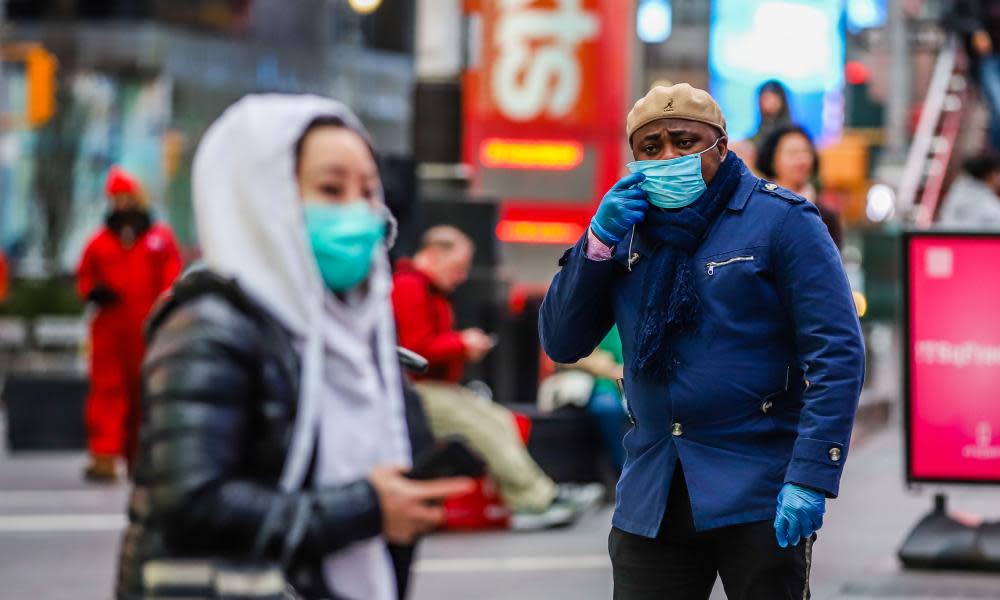America's extreme neoliberal healthcare system is putting the country at risk

At the final debate of the Democratic presidential primary on Sunday, Senator Bernie Sanders and Joe Biden clashed on the coronavirus. Sanders contended the pandemic laid bare “the incredible weakness and dysfunctionality” of the US healthcare system, and called for single-payer reform. Biden countered that Italy’s universal system had failed to protect the Mediterranean nation, and asserted that Covid-19 “has nothing to do with Bernie’s Medicare for All”. At first glance, the ex-vice-president seems right: of course single-payer can’t close the door to a novel virus, any more than it can forestall a deadly earthquake or fend off a zombie apocalypse. Nonetheless, a national health program with unified financing and governance – basically the opposite of what we have in America today – is a powerful tool in a health crisis.
Related: Coronavirus has taught Italy hard lessons. Other countries must learn from us | Maurizio Molinari
The debate over Medicare for All in the age of Covid-19 is complicated by the fact that it is our public health agencies – and not the medical care system – that serve as our first line of defense against novel epidemics. In that regard, we’ve shot ourselves in the foot with a 12-gauge shotgun: year after year of underfunding of our federal, state and local public health agencies has left us ill-prepared for the Covid-19 challenge (as evidenced by the testing fiasco). How we finance medical care, however, is also critical. On the most basic level, containing the coronavirus will require those infected to seek medical care, so that they can be diagnosed and isolated. Fear of devastating ER or hospital bills, however, could keep some home – or at work. As a Taiwan government spokeswoman, lauding her country’s single-payer system for its successful containment of Covid-19, told NBC News, “Taiwan’s health insurance lets everyone not be afraid to go to the hospital. If you suspect you have coronavirus, you won’t have to worry that you can’t afford the hospital visit to get tested.”
On Wednesday, Trump signed into law a bill that would make Covid-19 testing – but not treatment – free. It’s hence inadequate, given the predicted looming surge in hospitalizations from Covid-19 pneumonia. After all, 30 million Americans are uninsured – a number that will surely grow as the economy tanks and millions or tens of millions of Americans lose their jobs. Even more are underinsured, and for these individuals, co-pays and deductibles will only become more unaffordable as disposable income falls and savings dwindle. For both groups, medical bills for an intensive care unit (ICU) stay for Covid-19 could be devastating. People, of course, will also not stop having heart attacks, cancer or traffic accidents during this outbreak – on the contrary, medical needs are likely to rise in the face of a recession, as unemployment and misery takes its toll on the nation’s health. Financial ruin from medical costs – whether it stems from Covid-19 pneumonia or the looming Covid-19 recession – is financial ruin all the same, and will compound the harm of the epidemic.
But there’s more to it than that. We need single-payer not only to protect us from healthcare costs, but to transform our healthcare infrastructure. In recent weeks, you may have heard that the US, despite our high healthcare spending, has fewer hospital beds per capita than many other wealthy nations. You may have also heard in recent years about an epidemic of hospital closures in poorly served rural areas, or the 2019 closure of a major academic safety-net hospital in Philadelphia. These hospitals closed not because they are unneeded, but because they are unprofitable. For the American hospital landscape is shaped by market forces, which largely determine where hospitals grow and where they wane.
Healthcare in America is uncoordinated – and ungoverned
At the same time, while our hospital bed supply is relatively low, our ICU bed supply per capita is among the highest in the world. Yet those beds aren’t necessarily where they need to be: a 2010 study in the Journal of American Medical Association, for instance, found large regional disparities in the distribution of ICU beds; the researchers concluded that in the face of a major epidemic, some areas might have empty beds, while others would have too few. Again, this distribution, far too often, is driven by market logic – not health needs.
Finally, healthcare in America is uncoordinated – and ungoverned. Since the epidemic’s onset, hospital and city and state governments have waged “bidding wars” over crucial supplies and ventilators, the New York Times noted. It’s every hospital for itself: some are resorting to pleas to the community for donations of masks; presumably, others are well-stocked – but who knows? “Respirators, ventilators, all of the equipment – try getting it yourselves,” Trump suggested to state governors on Monday, quoted by the New York Times. This is not a healthcare system – it is atomized chaos. For again, in the American way of paying for healthcare, our hospitals (or increasingly, our multi-hospital systems) are silos, some rich and some poor, each fending for themselves, locked in market competition.
This is neither necessary nor rational, leading both to excess and shortfalls, to generous overall health system funding yet care that remains unaffordable for many. A single-payer national health program would allow us to move past the market-driven status quo to remake this chaotic healthcare landscape of simultaneous healthcare plenty and poverty. It would, in short, allow us to begin to plan – not merely for this epidemic, but for the one that follows.
Adam Gaffney is an instructor in medicine at Harvard Medical School and a pulmonary and critical care doctor at the Cambridge Health Alliance. He is President of the advocacy organization Physicians for a National Health Program. He blogs at theprogressivephysician.org

